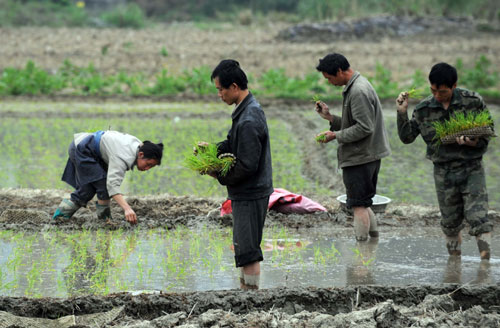China hikes minimum grain purchase prices
(Xinhua)
Updated: 2008-03-28 11:18
Updated: 2008-03-28 11:18
BEIJING - China has raised its minimum purchase prices for rice and wheat for a second time this year to encourage grain production and curb inflation, the National Development and Reform Commission (NDRC) said on Friday.
The increases were announced one day after the government pledged an increase of 25.25 billion yuan (3.6 billion US dollars) to this year's rural budget, a step aimed at boosting farm production and quelling an inflationary surge blamed on rising food prices and tight supplies.
 Farmers plant rice seedlings in Tianlin County in Baise of South China's Guangxi Zhuang Autonomous Region March 27, 2008. [Xinhua] |
The previous hike this year, on February 8, lifted the minimum prices for rice and wheat to 75-79 yuan and 70-75 yuan, respectively.
The NDRC also said that the minimum price system would be expanded to cover the northeastern province of Liaoning, which would become the third province -- after Heilongjiang and Jilin -- to have minimum prices. China began setting minimum purchase prices in 2004 to encourage production.
The Consumer Price Index, in which food prices have a large weight, hit a near 12-year high of 8.7 percent in February. The government earlier froze prices of grain, cooking oil, oil products and other basic goods in an effort to cool inflation.
Costs of farming inputs, including fertilizers and seeds, have risen, adding upward pressure to farm produce prices.
These new moves will help curb fast-rising prices and ensure sufficient grain supplies to combat inflation, said Song Hongyuan, the deputy director of the Research Center for Rural Economy under the Ministry of Agriculture.
It sends a signal to farmers that planting crops means making money, which is important because grain prices will only stabilize if supplies are guaranteed, Song said.
"China should increase policy support (for agriculture) with clearer, straighter and stronger signals to mobilize and protect the initiative of farmers to plant crops," Premier Wen Jiabao told a national video conference on Thursday.
This winter's severe weather and the drought that hit northern China this spring, during the ploughing season, will make it harder to ensure grain supplies this year, Chen Xiwen, the director of the office of the central leading group on rural work, has said.
Wen ordered officials to be "fully aware of the utmost importance of further reinforcing agricultural and grain production" in Thursday's meeting.
The cabinet agreed that 15.6 billion yuan of the extra funding would be used to subsidize farmers' purchases of production materials, including diesel oil, fertilizer and pesticide. The new sum lifted such subsidies to 63.8 billion yuan this year.
Also, 5 billion yuan was added to seed purchase subsidies, bringing the total to 12.07 billion yuan, which would cover 29.5 million hectares of rice, 13.4 million ha of wheat and 13.4 million ha of corn.
|
||
|
||
|
|
|
|